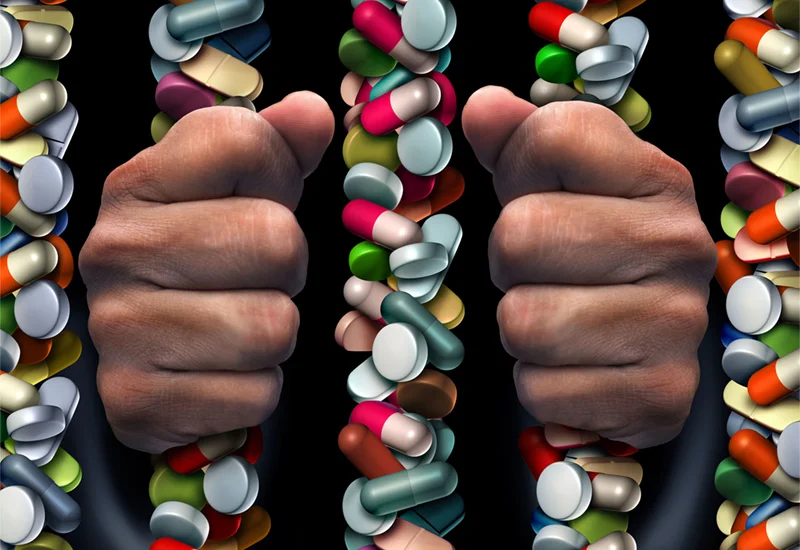Drug Addiction is the disease of addiction is a medical illness characterized by its chronic, progressive, and fatal nature. It causes the victim to compulsively and repeatedly engage in drug-seeking use and that too in the face of repeated negative results and suffering not only for the suffering patient but also for his family. As in most cases, the decision to take the drug for the first time is voluntary. Later, when it results in drug addiction, it severely challenges and hampers the addict's ability to resist cravings and urges for drugs.

Insidious in its nature and development, addiction is widely recognized by patients and doctors alike to be a cunning and baffling disease. Moreover, it has ways and means to sustain itself in the face of resistance. Despite all the negative changes it brings into a patient's and his family members' lives (changing a kind person into a hostile one, flipping a perfect gentleman up into a lousy and violent individual) the drugging continues, and a vicious cycle ensues. Addiction is a biological metabolic disorder due to which the drug is taken quickly disintegrates into toxins (the first stage, which should have been slow) and very slow clearance of these toxins. This lag in handling leads to accumulation, hence, the term intoxicated.
The intoxication is more than a word that it is; it silently steers a person to a thinking and living pattern based on denial and delusion. The state of denial doesn't let the drug user see the menace of the drug addiction approach. It also leads to slow reflexes and weak responses. Although in such a case, addicts can perform previously learned habits and routines to a minimally acceptable level, nonetheless; they cannot learn new things or manage instant decisions. This results in unexplainable road accidents and crash landings of airplanes (with damaged tires and landing gears). In short, it is due to this faulty biological handling that addiction occurs. Addition starts in biology and leads to a chain reaction that deteriorates the psychological, social, and spiritual areas of a person's life.
30 Drug Addicts Die Every Minute in Pakistan
Around 8.9 million people in Pakistan are drug addiction addicts, while
700 people die every day in
the country due to drug-related complications making the deaths related to drugs greater than those
caused by terrorism.

Similar to other chronic, relapsing diseases, such as diabetes, asthma, or heart disease, drug
addiction
can be managed successfully. As with other chronic diseases, it is not uncommon for a person to relapse
and begin abusing drugs again. Relapse, however, does not signal treatment failure—rather, it indicates
that treatment should be reinstated or adjusted and help the individual get back in recovery. People
find
it difficult to say and find out if someone they love or value is suffering from alcohol or drug
addiction
since that person is almost always ready to go to great lengths to hide the problem. But there are
evident
and telltale signs that show something in this regard is terribly wrong. Below is a brief list of
typical
warning signs.
Like other chronic illnesses; Addiction is a chronic illness. It shares a lot with illnesses such as
diabetes, heart disease, cancer, etc. Likewise, it can also be managed with very good excellence. As in
these illnesses, it sometimes relapse emerges and the patient begins using drugs again. This also
happens
when addiction is not managed by a structured, result-oriented, and proven-to-work program. Such
problems
lead to deterioration in the morale of the loved ones of the patient as well as reinforcing a popular
belief that addicts and addiction cannot be treated. By all means, it does not indicate a failure on the
part of the treatment—it rather indicates that treatment is to be reinstated and adjusted so as to
address
the needs of the patient and the illness.
Points To Ponder
- Drinking, drugging, and getting high on a regular basis.
- Seeking and using more drugs than before to get the same effect.
- Planning and thinking about quitting but unable to do so.
- Lying about drinking and drugging.
- Social isolation in order to facilitate drinking and drugging.
- Withdrawal from family members, spending more time alone in a room, and secrecy.
- Gross changes in sleeping or eating habits.
- Memory problems, attention problems, difficulty concentrating on day to day responsibilities of life.
- Aggression, hostility, and defensiveness.
- Drop-in grades and performance in school, education, and in other areas of life.
- The smell of alcohol. Marijuana etc. on your loved one's breath or clothes and the use of mints, mouthwash, and air fresheners in order to cover up.
- Slurred, incoherent speech, roadside accidents, and other problems pertaining to alcohol and drug use.
- Bloodshot eyes and bottles of eye drops to mask them, indicative of the use of marijuana, alcohol, and other drugs.
- Medications, money, or other valuables missing from your home.
